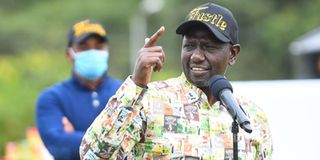Premium
ICC denies talk of fresh Ruto probe as allies revive claims

Deputy President William Ruto.
What you need to know:
- The ICC in 2018 had said in its annual report submitted to the United Nations General Assembly that investigations were still going on.
- Led by Jubilee deputy secretary-general Caleb Kositany, they claimed yesterday that there are investigations going in the Rift Valley related to the 2007-08 mayhem.
The International Criminal Court has distanced itself from any investigations which might be going on in the country with the aim of reviving the 2007/08 post-election violence cases.
The court has dismissed claims by Deputy President William Ruto, who is expected to run for the top seat in the 2022 General Election, that there is an elaborate plot to send him back to The Hague.
“The Office of the Prosecutor cannot comment on speculation,” states Fatou Bensouda in an email to the Nation. On whether the government is cooperating with The Hague in gathering new evidence, Ms Bensouda’s office is open to any individual or body to furnish it with fresh information.
“As a general matter, in accordance with article 15 of the Rome Statute — the founding treaty of the ICC — any individual or group from anywhere in the world may send information on alleged crimes to the ICC Prosecutor, who is duty bound to protect the confidentiality of the information received,” she said.
The ICC in 2018 had said in its annual report submitted to the United Nations General Assembly that investigations were still going on. “The office of the prosecutor continued to receive information on the commission of crimes against humanity during the post-election violence of 2007/08.”
Post-election violence
The DP’s lieutenants have reintroduced The Hague narrative to rally his base in battle for the top seat ahead of the 2022 polls. Led by Jubilee deputy secretary-general Caleb Kositany, they claimed yesterday that there are investigations going in the Rift Valley related to the 2007-08 mayhem.
“They sent four officers here from Nairobi to collect all the 2007-08 post-election violence files. People also died in Naivasha and there were also clashes in Mombasa, Nairobi and Kisumu; why only files from Eldoret?” Mr Kositany posed.
This is not the first time the DP’s allies are alleging such a scheme. In an interview with the Nation early this year, Dr Ruto had claimed that a “cabal that went out of its way” to try and stop him and President Uhuru Kenyatta from ascending to power in 2013 was now plotting to block him from the 2022 polls.
“As of last year, I was having a discussion with the Director-General of NIS (National Intelligence Service), Philip Kameru, and I learned that there are people who are ready to come and open the ICC cases,” Dr Ruto said.
Political reasons
His director of communications, Mr Emmanuel Talam, accused his political foes of pushing the ICC agenda to stoke ethnic tensions: “The DP is aware about the plot to revive The Hague case for political reasons but is not bothered. It is a hopeless scheme to take the country back. Kenyans are wiser and can see through the schemes.” Kapseret MP Oscar Sudi accused Interior Cabinet Secretary Fred Matiang’i and Principal Secretary Karanja Kibicho of being behind the fresh investigations: “These people are trying to use anything to bar the DP from running. The officers moving across the Rift Valley have been sent by Matiang’i and Kibicho.”
Aldai MP Cornelius Serem said: “It is now common knowledge that there are officers moving across the region collecting information on the 2007-08 post-election mayhem. There is no evidence that Ruto planned what happened in the violence.”
Keiyo South MP Daniel Rono said the plan was to taint the DP’s image.
“They are trying to drive a wedge between the DP and other tribes to start tribal clashes and blame it on Ruto,” he said. Police spokesperson Charles Owino, however, dismissed them as ‘wild allegations’.
One of the hurdles that the ICC experienced during the prosecution of the 2007-08 post-election violence cases was that the court was unable “to adequately respond to the challenges presented in cases against powerful, high level accused willing to engage in concerted propaganda campaigns and pervasive witness interference”.




